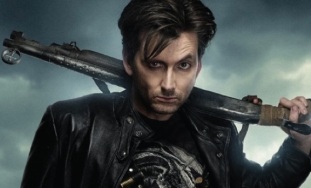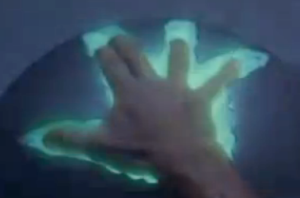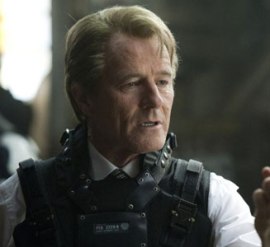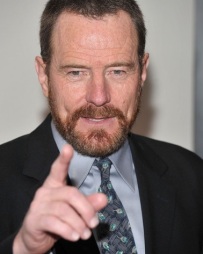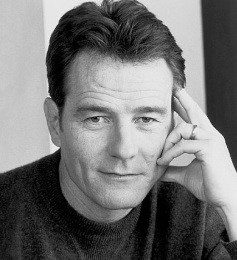Oh, look! Colin Farrell is out remaking our childhoods again. I can understand why they remade Fright Night. The young adult vampire story is a big seller right now and if nothing else, the original Fright Night certainly has a healthy dose of vampires and young adults, so a remake made a lot of sense.
It also stars David Tennant, which automatically makes any movie worth it.
I have a much more difficult time, however, wrapping my head around a Total Recall remake. I know that Paul Verhoeven’s 1990 original isn’t a masterpiece per se, but it accomplishes everything it needs to. It’s fun, suspenseful, and accurately captures both the panic and excitement the question “What if everything you thought you knew about yourself was wrong?” lends itself to. Yes, it can be a bit campy and silly (after all, it is an Arnold Schwarzenegger movie) and some of the special effects, while innovative, have not aged well, but I don’t feel these qualities alone prime the film for a gritty reboot.
The original Total Recall is also a very politically charged film that played an important role at the end of the Cold War. Throughout most of the 1980s and the first year or two of the 90s, Western audiences were treated to an onslaught of films starring “All-American” action stars such as Sylvester Stallone, Bruce Willis, and Arnold Schwarzenegger. Susan Jeffords coined the term “hard bodies” to describe these actors for they represented a strong, incorruptible, and unbeatable America that could be showcased in the final years of the Cold War. Some of these films are more blatant in their political agendas such as Rocky IV, which displays physical and moral dominance over the Soviet Union, and Rambo: First Blood Part II, which essentially serves to undo the war in Vietnam, but Total Recall is an interesting film in the bunch. By 1990, the Cold War was all but over and what better way to show this than have the hard-bodied Schwarzenegger travel to the degenerative, near-uninhabitable Mars (its red surface I’m sure is no coincidence) to assist a group of rebels overthrow the corrupt, oppressive governing body and single-handedly transform the planet into a place of beauty and freedom.
No, he does this LITERALLY single-handedly.
The political reading of the film isn’t quite that simple, however. Just like RoboCop’s warnings about the corporatization of policing, Verhoeven makes sure capitalism isn’t overlooked in Total Recall either. The film’s villain Cohaagen (Ronny Cox), while a dictator in many respects, is a businessman at heart. He privatizes Mars’ natural resources, maintaining a dangerous monopoly over oxygen and protection from the planet’s radiation to the point that citizens have to pay in order to survive. On Mars, life is a privilege for the wealthy, while the poor suffer serious mutations as a result of shoddy accommodations. It’s in this critique that I feel a remake of Total Recall could be warranted. Just like vampires, the economy and the implications of its current state are hot issues. The rebel motif has also gained relevance in today’s society with the ongoing political protests in the East and the Occupy Movement still a recent memory in the West. Perhaps it’s time that the political message of Total Recall was updated for this generation so it can accurately reflect back to us our emotions and anxieties in a time of change and unrest as effectively as the original does so with the fall of the Soviet Union and the rise of global capitalism.
Or it could just be a shallow, mindless action flick.
In spite of Wikipedia’s claims that the remake exhibits stronger political overtones than the original, I certainly didn’t pick up on any. The Mars plot is understandably scrapped this time in favour of a near-desolate Earth where the remaining population is divided into the rich citizens of the “United Federation of Britain” and the working class of “The Colony”. The plot is updated so that Quaid (Schwarzenegger in the original, played in this film by Farrell) is fighting his own brainwashing to uncover a plot to invade The Colony and replace its citizens with synthetic robot workers. While an interesting angle, it’s not explored nearly as deeply as it should be in order to convey any semblance of a politically relevant message. There is something to be said about the working class being phased out for the sake of efficiency and profit maximization, but this has been an ongoing issue to some degree since the dawn of industrialism. Not exactly the most topical issue. You don’t exactly get a 99% vibe from The Colony either. The rebels are virtually stripped of their importance, more or less existing simply because they were in the original movie, and despite being constantly exploited and ostensibly on the brink of extermination, there’s a disturbing contentedness to The Colony’s citizens. There’s a scene early on in the film where Quaid delivers the standard “Do you ever wonder if there’s more to life than this?” speech and is mocked by a coworker over it. As for Cohaagen’s evil scheme, the whole thing feels less like the byproduct of corporate greed and more like a rehash of the Third Reich with his planned invasion of the ghettos to exterminate the population and replace them with his own flawless synthetic workers.
He’s also blond, but I fail to see the relevance.
A lack of deep exploration seems to be Total Recall’s biggest problem across the board. The film often passes up developing and examining the meaning of its own aspects in favour of something that just looks really cool onscreen. The environments of the film are visually very striking and I enjoyed the action sequences, but they’re simply not enough to sustain a story. One of the more notable additions to the remake is the introduction of the synthetic police force: an army of robotic officers intended to more efficiently carry out the law. There are some very chilling implications of an increasingly ubiquitous and inhuman police presence and you think the film would explore this considering how gung-ho Cohaagen seems to be about them, but they’re instead reduced to mere henchmen that are more visually dazzling than real people because they short-circuit and sometimes blow up when you fight them. The same issue comes up with Cohaagen (Bryan Cranston, in this film). There’s something very unsettling about the villain in the original Total Recall being a suit. Perhaps it has something to do with the realness of an antagonist who reflects the people running the world at the time, not to mention the fascinating contrast with Quaid. He’s the Lex Luthor to Schwarzenegger’s Superman. But in this film, they decide to “cool him up” by making him younger and highly skilled in martial arts and knife play. The character feels quite contradictory as a result and a lot of focus is taken off of what truly makes him a menacing villain.
“I’m warning you. I know Kung Fu.”
If it stood on its own, I might of been kinder to Total Recall. It still manages to capture to some degree the intensity and suspense of learning your life is a lie, it’s fast-paced and action-packed, and the strong visuals prime the film for an enjoyable IMAX/AVX viewing, but it’s still a remake. We already have a Total Recall movie, so it automatically becomes the job of this film to justify why we now need two of them. It fails in this regard. There’s nothing about the Total Recall remake that doesn’t work better in the original and the changes they do make to the story and characters come off as simply trying to make this movie seem different – an effort that appears trivial at best and undermines the strength of the film at worst.
Just in case there weren’t enough pictures of Bryan Cranston.
I give it 2.5/5.

